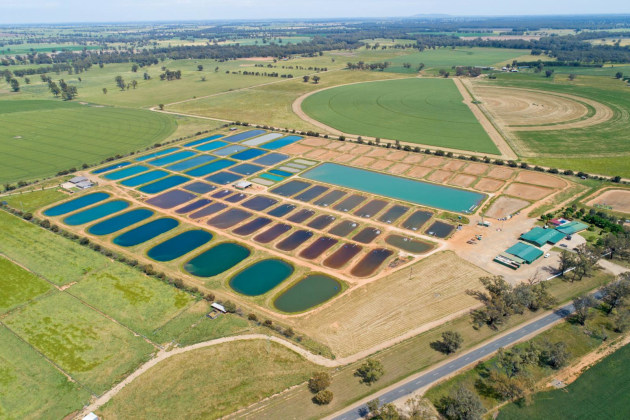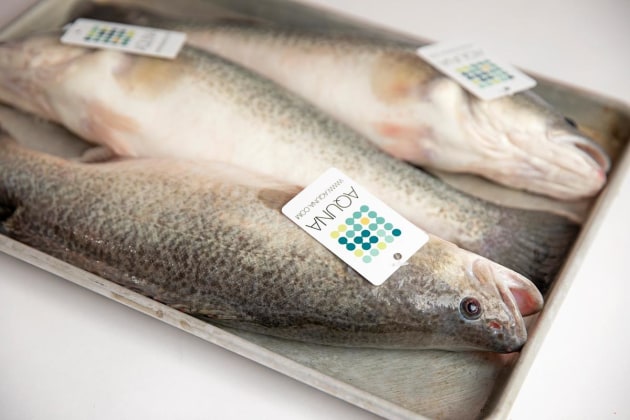After years of sustainable practice and the backing of celebrity chefs, Aquna Sustainable Murray Cod is still committed to its sustainability principles while building greater consumer awareness. Pippa Haupt writes.
It is a big claim to say your aquaculture operations are the most sustainable in the world, but it is one Ross Anderson, chair of ASX listed Murray Cod Australia stands behind.
Murray Cod Australia is the trading company of Aquna Sustainable Murray Cod, an aquaculture operation based in the Riverina region of New South Wales. Aquna was launched as a rebranding exercise in 2018 and has gained the attention of high-profile chefs like Heston Blumenthal ever since.
With a major focus on sustainability, research projects, and product quality, Anderson says the biggest challenge is getting consumers on board. It is doing so through a four-pronged campaign.
1. Cod quality
“Everything we do is focused on how we continue to improve the quality of the fish – how do we handle it? How do we grow it? What do we feed it? How do we look after the water? And from that comes a big focus on innovation,” Anderson says.
The Aquna team is constantly looking at better ways to improve the quality of the fish through water treatment, the use of nets, and what occurs in the farm’s ponds. Feedback from those processes is used to continually improve the quality of the fish, the way they are grown, the fish health, and also the nutritional benefits for end consumers.
Anderson says Aquna Murray Cod is one of the only freshwater fish in the world used to make sashimi.
“The reason for that is we don’t have the microbes in our water system. We have a beautiful clean water system, free of the microbes that can cause issues with other freshwater fish,” he explains.
The company’s Australian-made system is custom-designed to mimic cod’s natural environment and provide the fish with the right growing conditions.
“Our Murray cod is grown in open ponds, in their native water, using industry-leading, sustainable practices. Our purpose-built systems allow us to grow tastier fish, without the earthy taste often associated with wild freshwater fish,” Anderson says.
2. Sustainability
Anderson says Aquna’s farm is probably the most sustainable fish farm in the world.
“We have a fairly low fish meal content; our fish meal content can be as low as 15 per cent of a kilo of food, and we have conversion ratios as low as 1.2 kilos of food to produce a kilo of fish flesh,” he says.
“At the moment, some fish farms around the world cop criticism for fish faeces going onto the bottom of the ocean, seals being affected, dolphins getting caught in nets, and the quantity of fish meal going into the feed.
“It’s not terribly sustainable to be taking a kilo of fish meal out of the wild catch ocean to only grow less than a kilo of farmed fish. The whole reason for farming fish is to save our oceans,” he says.

Aquna has also achieved zero organic waste at its Griffith processing plant, with tonnes of organic waste diverted from landfill through partnerships with recyclers and local farmers.
Similarly, the nutrient rich water from the ponds is used to irrigate crops and pastures located near its operations.
It has also reduced its water usage by half through closer monitoring and water management practices.
“Fish tend naturally to want to school together, meaning they’re happy not having a lot of space. So, what happens is because we’re not using a lot of space and our food efficiency is high, the amount of water that we are using is very, very low,” says Anderson.
The addition of solar panel systems to infrastructure has helped achieve greater efficiencies, with 50 per cent of power in its Bilbul nursery operations now solar powered. Anderson says it makes sense for the business, both reducing the company’s energy costs and reducing greenhouse gases.
Upgrades to processing plants are also underway, initially hindered by Covid and a wet summer, and a new breeding facility new Mildura is planned, with indoor, light and temperature-controlled facilities increasing out of season breeding and reducing the reliance on natural spring spawning.
3. Innovation
The company has multiple projects underway, once is a selective breeding program with the national science body CSIRO, now in its second year.
“It is researching improving fish health, fat content, and the omega sixes and threes; essentially the overall quality of the flesh,” Anderson says.
Aquna is trialling different fish feeds to see how they impact health, growth, and in particular the flavour of the fish.
Anderson recalls when chef Heston Blumenthal visited Aquna’s Bilbul farm.
“He picked up a piece of fish food and actually ate it. He wanted to taste it to see if it would have a positive or negative impact on the, on the flesh.
“He said, “Oh, that’ll make it taste quite okay”,” he says
Experimentation with maintaining water quality is ongoing, ensuring the right balance of algae bacteria, protozoa, and plankton in the pond waters.
“The balance in the water helps promote the cleanliness of the fish and oxygenation; if the right balance of algae is there, itwill produce oxygen for the fish as it photosynthesises,” Anderson explains.
4. Integrity
Anderson says that when eating Aquna cod, you are eating one of the rarest fine dining fish in the world – at the moment.
“Not only does it not grow anywhere else in the world, but it also doesn’t grow anywhere else in Australia.
“From a product integrity point of view, we want you to be able to know who its mother and father is, how it has been treated in the water, and what has been in that water.
“We are one of the only fish farms in the world that doesn’t use antibiotics in our grow out systems.

“We want consumers to know what the fish has been fed, how it has been harvested, how it has been humanely treated until from the day it is born until the day it hits your dinner plate.
“The reality is it’s a magnificent icon of Australia,” says Anderson.
The company has experienced the issues many businesses have faced in recent years – Covid disruptions and associated impacts to the supply chain and export markets, a shortage of skilled labour and difficulties sourcing capital equipment.
Aquna’s processing capacity has been hindered due to equipment coming from overseas being delayed due to supply chain issues. The company said it is now installed and once fully operational will see a “huge increase” in processing capacity and ability to supply the grocery channel.
The cod is now stocked in selected Woolworths, Coles and Harris Farm stores.
This summer will see Aquna trial its first free range grow out ponds, which will involve growing fish in ponds without cages. The outcomes of this will determine production systems down the track.
The expansion of its Whitton site is underway and the addition of 16 ponds expected to be completed this summer.
At the Royal Agricultural Society's 2022 Spring Aquaculture Show, Aquna won Bronze in the Fresh Fish category, and
Gold in the Smoked or Cured Products category, for its Hot Smoked Murray cod.
This story first appeared in the August issue of Food & Drink Business magazine.








